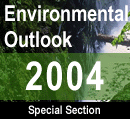
Surveys
DJC.COM
July 29, 2004
2004: A great year for the local environment
Washington Environmental Council

Geiger
|
For over 35 years, the Washington Environmental Council has worked to protect the state's land, air and water. A relatively recent legislative partnership between WEC and the Washington Conservation Voters has helped set and effectively push for passage of needed improvements in state laws and get the funding and enforcement to make the laws work.
And in 2004, the Legislature delivered a rare performance: several important environmental gains and no losses. In an era when virtually all politicians talk about environmental values, it is rare that their actions translate into such positive progress. The 2004 performance is based on various factors — most notably the environmental community's preparation and coordination, election year sensitivities and a little luck.
Making progress in the Capitol
Toxics reduction: Funding for the state's Persistent Bioaccumulative Toxics program was restored, ensuring that the most harmful chemicals in our society, such as mercury, dioxin and others will ultimately be reduced in our environment.
Sustainable state forests: A provision in the capital budget passed that requires the state Department of Natural Resources to inventory and map old growth in state forests and notify the public before it is logged.
Healthy streams: Progress was made on a bill to protect water in streams and a bill was defeated that would have increased the hoarding and speculation of the public's water. On the positive side, $1 million was secured to help keep streams from being tapped out and improve water management.
Energy: New power plants will be required to mitigate 20 percent of their carbon dioxide emissions, the principle pollutant responsible for global warming. This will mean that as new power plants are built, the harmful impact on Mother Nature will be significantly reduced.
Honorable mentions: While outside the community's priorities, several other important environmental bills passed, including: oil spill prevention, a study on electronics recycling, and significantly improved safeguards for stormwater management. Stormwater is one of the leading causes of pollution in our rivers and lakes.
Rollbacks defeated: In addition to helping turn back numerous efforts that would have led to more sprawl by weakening the Growth Management Act, WEC successfully fought several other defensive battles. One example was the radical "eco-terrorism" bill. This bill was so broadly worded that it would have infringed upon the basic free speech of environmental advocacy organizations.
On-the-ground improvements
In addition to working to get state laws passed, funded and enforced, it is important to make sure that the on-the-ground changes are being made to protect our land, air and water.
Several innovative efforts have seen progress in 2004.
Shorelines: All local city and county governments are required to update their old shoreline protection plans. This means that over the next decade, we should see marked improvements for the protection and restoration of areas near our rivers, lakes and beaches.
How can regular citizens be involved? WEC has researched and published the Habitat Protection Tool Kit to assist in updating local plans to protect these important lands. Go to www.wecprotects.org or call (206) 622-8103 for a copy. When all the updates are completed, these improvements will result in better protection for fish and wildlife, cleaner water, and more enjoyable recreational opportunities.
WEC is holding regional training for people interested in helping to make these improvements a reality. If you are interested in getting involved, e-mail Jerry Gorsline at jerry@wecprotects.org.
Forests: Another innovative program is one to promote the production and sale of sustainable wood products. This summer, local consumers will have access to commercial supplies of lumber bearing the logo of the Forest Stewardship Council (FSC). Think of it like an organic label for produce in the supermaket. In addition to the consumer demand side of the coin, WEC and others are working to have the state forests FSC-certified and as a result increase the supply of certified wood.
Local retailers Dunn Lumber and the Environmental Home Center have agreed to stock FSC-certified lumber and other wood products in their Seattle stores for the summer. These stores have teamed up with three conservation organizations — Seattle Audubon Society, Washington Environmental Council and Northwest Natural Resource Group — to help promote FSC-certified lumber.
By purchasing FSC-certified wood products, consumers are supporting local, forest-dependent communities while contributing to the conservation of watersheds.
Streams: Bucking the trends of water wars in the West, local farmers and environmentalists are moving forward with a win-win solution for restoring Manastash Creek near Ellensburg. The plan is designed to protect threatened fish in the creek by screening water diversions, eliminating passage barriers and restoring stream flows, while ensuring irrigated agriculture and water right holders on the creek remain whole.
Local irrigators, state agencies, the Yakama Nation and the Washington Environmental Council successfully transformed a possible conflict over the Endangered Species Act into a positive collaborative process. Following two years of effort, the steering committee recently announced the hiring of a project manager and the formal launching of the restoration project.
To help make progress in other regions, WEC has researched and published the Stream Flow Protection Tool Kit in partnership with American Rivers. To get a copy and/or arrange training to help protect free-flowing waters in your area of the state, go to www.wecprotects.org or e-mail Josh Baldi at josh@wecprotects.org.
Tom Geiger is the outreach director of the Washington Environmental Council. He has worked with WEC since 1996.
Other Stories:
- Conditional closures — another cleanup remedy
- Washington tests watershed management
- Todd Pacific halts a dirty waterfront legacy
- Going green? Try calling on your contractor
- Emerald City must fight to stay green
- Seattle prepares to ‘re-green' 2,500 acres
- Washington's new paint law gets the lead out
- Putting a price tag on nature
- South Lake Union: a model for sustainability
- Guy Battle: design and build to suit your climate
- Contractor finds silver at new headquarters
- Government finds gold at Sea-Tac Airport
- Getting to compliance with a systems approach
- Don't let your site be taken to the cleaners
- Salmon get a boost from technology
- Low-impact development comes to Pierce County
- Energy Star label now ready for homes
- Improving traffic flow for fish, people
- Troubling times for Hood Canal's waters
- Quick Duwamish cleanup begins with teamwork
- Utilities to study energy coming into homes
Copyright ©2009 Seattle Daily Journal and DJC.COM.
Comments? Questions? Contact us.